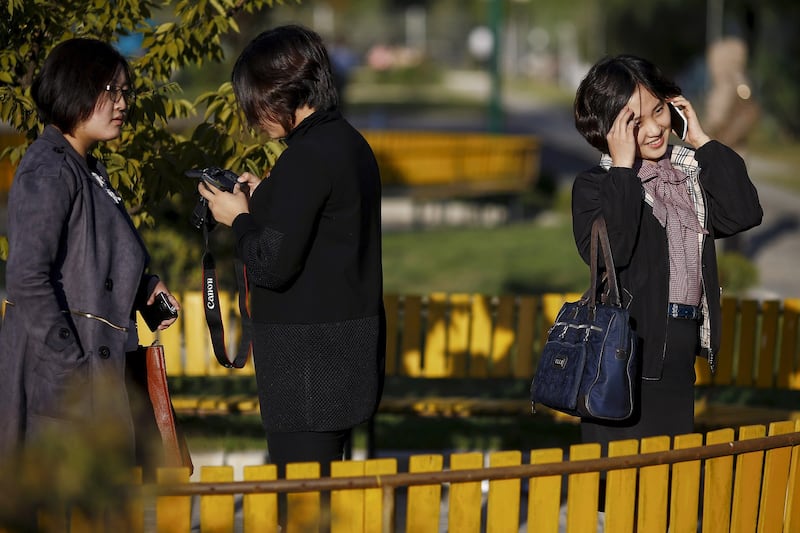“Hey bro, I can’t make it out tonight. There’s a big test tomorrow that I gotta study for.”
"Fighting!"
Using that English loanword in a text to offer encouragement could now get North Koreans in trouble.
Police in the country are randomly stopping people on the street to check their text messages for the offending expression, “Fighting!” – picked up from South Korean dramas smuggled into the country – and punishing them with up to six months in a disciplinary labor center, residents told Radio Free Asia.
It’s the latest attempt by North Korean authorities to eradicate influence from the capitalist South, derided as a “puppet” of the United States.
Three years ago, North Korea enacted the Rejection of Reactionary Thought and Culture Act, which lays out punishments for various cultural offenses, like watching or distributing South Korean media, not wearing the correct traditional attire during weddings, and even dancing like a capitalist.
One of the milder offenses is for speaking or writing like a South Korean, and North Korea has been punishing people caught using South Korean vocabulary, spelling, slang, or even singing South Korean-style songs.
‘Konglish’
The term "fighting" is an example of Konglish – English words that are used in Korean – but in a way that might not be readily intelligible to a native English speaker.
For example, a cell phone might be referred to as a “handphone,” a coffee mug could be called a “mug cup,” and a buy-one-get-one-free deal is described as “one plus one.”
The expression “fighting,” which has been part of the South Korean lexicon for several decades, means something similar to “you can do it!” or “don’t give up!”
The expression has appeared in South Korean TV programs, which are smuggled into the North on flash drives and secretly – and widely – circulated, to the chagrin of authorities who want to stamp out any influence from the capitalist South.

To keep such usage from spreading, police are checking cell phones of people on the street, a resident of North Pyongan province, in the country’s northwest, told RFA Korean on condition of anonymity for personal safety.
“The day before yesterday, a social security agent inspected the text messages on my cell phone while I was passing by Sinuiju Station Square,” he said. “The reason why social security agents are cracking down on young people’s cell phones is to censor text messages and catch people using the puppet word ‘fighting.’”
Specific search
The resident said that since the law went into effect, the authorities would often confiscate devices to see if the user was storing any South Korean TV or movie files, but this is the first time that they have inspected all of a user’s text messages for a specific word.
“I don't know how many people were arrested by the social security department throughout the day, but as I was waiting for my turn to be inspected, I saw a female worker at a textile factory who looked to be just over 20 being taken to social security department after sending a ‘fighting’ message to a coworker,” said the resident.
If punished under the Rejection of Reactionary Thought and Culture Act, users of the word “fighting” in text messages could be sent to a disciplinary labor center for up to six months.
Authorities in South Pyongan province, north of the capital Pyongyang, began inspecting cell phones of college students and young people on Nov. 27, a resident there told RFA.
“‘Fighting’ is the most commonly used word among young people these days,” he said.
Crackdowns on other South Korean-origin words have resulted in those words disappearing from the mouths and text messages of North Korean youth, the South Pyongan resident said.
These have included "oppaya," which literally means older brother, but can be a term of endearment from women to older men in their lives, "namchin," which is an abbreviation of "namja chingu," which means boyfriend, and "ttaranghae," which is a cuter way of saying "saranghae," or I love you. Also gone from North Korean texts these days is "ㅋㅋㅋ" (pronounced keukeukeu) which represents laughter in a way similar to "lol" in English.
“No matter how much the judicial authorities crack down on cell phones, it will not be easy to completely eliminate South Korean language and speech among young people,” he said.
Many young North Koreans, he said, think these South Korean expressions are more effective at communicating feelings of love and friendship than the North Korean-style of speaking.
Translated by Claire Shinyoung Oh Lee and Leejin J. Chung. Written in English by Eugene Whong. Edited by Malcolm Foster.
